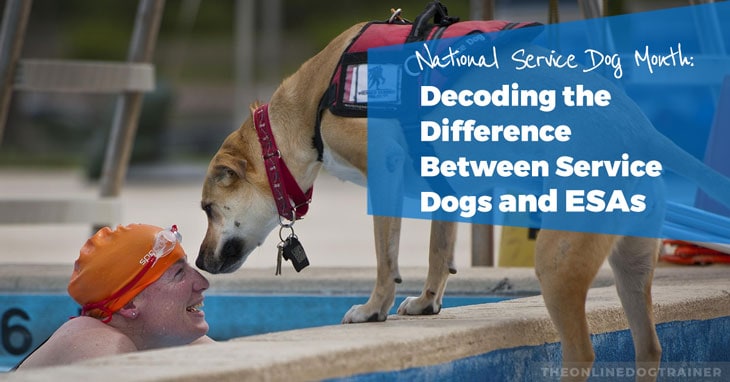
For hundreds of years, dogs have been trained to support humans in a variety of work tasks. It’s amazing to think that our canine counterparts can be trained to…
- Work in the police force/military.
- Hunt/protect farm animals/herd.
- Alert security to drugs/bombs in airports, stadiums, etc.
- Assist people with special needs.
- Detect medical emergencies like seizures.
- And the list goes on and on!
It’s not uncommon to see a dog working to support an owner with an illness in a restaurant or sniffing bags at the airport to ensure flight safety.
However, with the popularity of using service dogs, there has been some abuse of what classifies a working dog that has led to lawsuits and other problems around the world.
While we don’t really want to get into the legal side of things, we do think it’s important—especially during National Service Dog Month—to define the difference between what classifies a dog as a service dog vs. being an emotional support animals so you don’t end up in trouble taking your pup somewhere he shouldn’t go.
To keep both you and your dog safe and out of harm's way, let’s decode the differences between service animals and emotional support animals.
What Classifies a Service Dog?
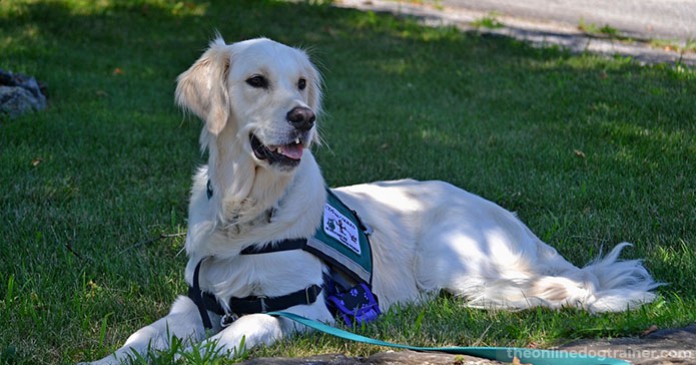
Service dogs are canines that have specific jobs related to ensuring the safety and wellbeing of their handles due to medical or mental illnesses.
Here’s the exact definition from The Americans with Disabilities Act…
“Any dog, regardless of breed or size, that is individually trained to do work or perform tasks for the benefit of an individual with a disability qualifies as a service dog. The work or task performed by the service animal has to be directly related to the handler’s disability.”
To fall under this classification, a service dog has to go through very specific training to learn a certain skill that will be used to assist its owner with daily tasks or notify him/her of medical emergencies before they occur.
Once trained, most service dogs are given actual certifications to prove that they are qualified to accompany their owners in public places, such as the grocery store or doctor's office.
What Classifies an Emotional Support Animal?
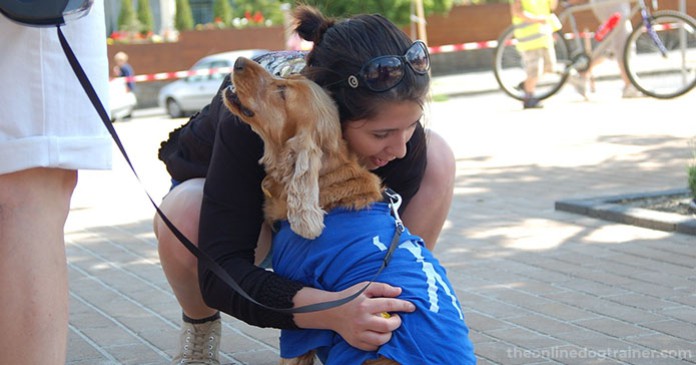
Contrary to popular belief, Emotional Support Animals (ESAs) are NOT service dogs.
In fact, any dog that is used for emotional support, therapy, comfort, or companionship does not meet any of the requirements that legal service dogs do, which limits where they are legally allowed to go.
Now, don’t get me wrong. I truly believe that emotional support animals serve a very big purpose. But, I also believe that it’s important to respect the boundaries set for ESA animals.
Here’s why…
Why It’s Important to Differentiate Between Service Dogs and ESAs
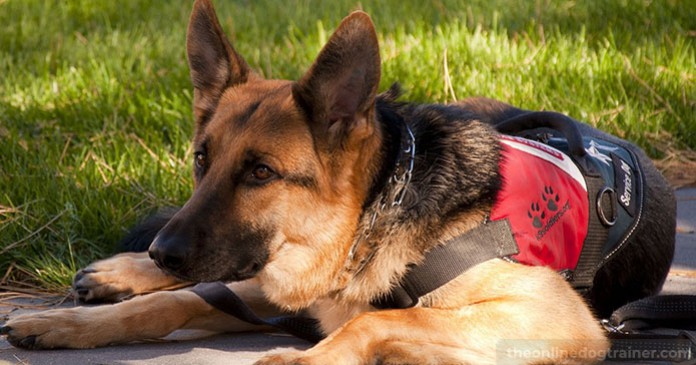
Why is it important to understand the difference between a service dog and an ESA?
Two big reasons…
- If you try and pass off an ESA as a service dog and an incident happens (someone gets hurt, property gets destroyed, etc.) you WILL be held legally responsible for the incident.
- Every time someone claims that a dog is a service dog when he truly isn’t and an incident occurs because the dog is not trained as a service dog, you make it harder on those who genuinely need service animals. This is not fair to the people who truly need their service dogs in order to stay safe or perform tasks while in public.
Sadly, some people will try to pass their pets off as service animals so they can bring their pups wherever they go. While I understand the desire to be close to your dog, it’s important to be honest about your dog’s role in your life.
For years now, uncertified, fake service dogs have made it more difficult for people who need assistance to bring their service animals into public places, and that’s not fair to those whose lives depend on having the canine companion to help.
Laws Regarding Service Animals Across the Globe
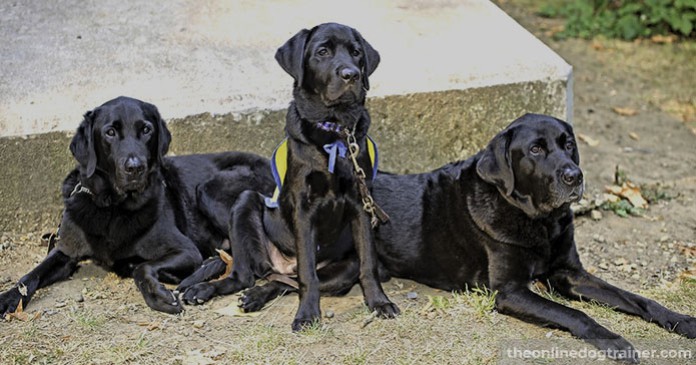
While most laws regarding service dogs are similar across the globe, there are slight differences in the rules and regulations from country to country.
If you or someone you know uses a service dog and is going to be traveling, it’s important to know the rules regarding your dog.
Unfortunately, we would be here all day if I outlined the regulations for various countries. So, instead, I want to point you toward a resource from MIUSA (Mobility International USA) that provides a lot of valuable insight into the regulations and rules in various countries.
How you Can Help Support Service Dogs During National Service Dog Month

Before I wrap up, I wanted to share a few things you can do to support service dogs/people with service dogs during National Service Dog Month and, of course, all year round.
Let’s dive right in…
- Be respectful of working dogs when you see them out and about. I know how tempting it is to want to pet a dog that crosses your path. But, service dogs have a job to do and can’t be distracted. If you see someone with a service dog, respectfully keep your hands to yourself so the dog can do his job.
- Be a responsible dog owner. If your dog is NOT a certified service animal, don’t take him places where normal canine companions are not allowed (restaurants, sporting events, etc.)
- Donate to Service Dog Organizations. Before a dog is certified as a service dog, he/she has to go through a lot of training which is usually conducted at some form of service dog training facility. Do a Google search for organizations that need your help in your area!
- Volunteer at a Training Facility. It takes a village to raise a puppy. For that reason, many organizations who care for and train dogs seek volunteer help. Whether you’re able to help with training or would be willing to clean crates, your willingness to lend a hand can go a long way.
- Stay educated. The best way to be an advocate for service dogs is to understand the rules and regulations surrounding the use of service animals. With the right knowledge, you can be an advocate for both service animals and their owners.
- Invest in a quality training program for your own dog. Poorly trained dogs contribute to the stigma that dogs can’t be trusted to behave in public areas. At the very least, ensuring your dog is trained can help shine a positive light on how amazing canines can be to those who are still wary about dogs who go out in public. If you’re not sure where to start, I recommend my program, The Dog Calming Code!
Happy National Service Dog Month!
Best of luck!,

~Doggy Dan 🙂





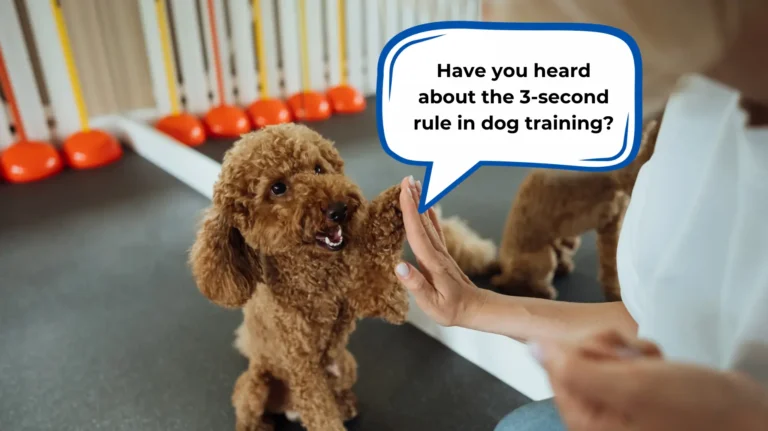
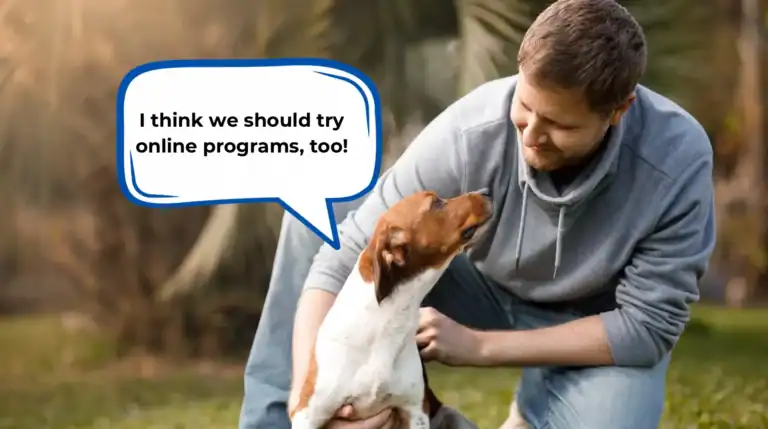
10 Responses
How do I learn to become a service dog trainer do you offer on line classes for that
Hi Michele, unfortunately we don’t offer courses for people to become service dogs trainers. My website is focused on helping owners overcome and avoid behavioural issues in their dogs. The information I provide, via my Dog Calming Code, can be used as a great way to build a trusting and cohesive relationship between owners/handlers and their dogs but the type of training that makes a service dog is not something we specifically cover. All the best, Doggy Dan
I am totally amazed at the transformation of my pups by utilizing Doggie Dan’s The Online Dog Trainer for just over 10 days. The 5 Golden Rules are remarkable tools. Thank you so much, Doggie Dan!
Hi Jan, thanks for the fantastic feedback! I’m so happy to hear it’s all going well for you…..it’s amazing what the right information and a little consistency can achieve in a short period of time. Best, Doggy Dan
How can I use the Dog calming code with a Service dog for PTSD? How does one establish being the pack leader when in need of the assistance of the dog? Will the dog feel it is the pack leader after a while? Especially if the dog is for psychiatric assistance.
Great question Claudette! The Dog Calming Code (DCC) is something that can be used to compliment service dog training. By starting off applying the DCC with the dog you can build a great foundation of trust upon which to then add other multiple forms of training, from agility to service dogs. This will mean that the dog will still look to their owner for everyday decisions about how to behave, but when required the dog will swing into action and perform the task they have been trained to do. Best, Doggy Dan
I have really enjoyed Doggy Dan’s training programs, very helpful with my German Shepherd.
Hi Brenda, thanks for your feedback and I’m really glad you found my program so helpful with your dog! Best, Doggy Dan
Hi Brenda, thanks for your feedback and I’m really glad you found my program so helpful with your dog! Best, Doggy Dan
Dogs are definitely amazing animals Jojo! Doggy Dan